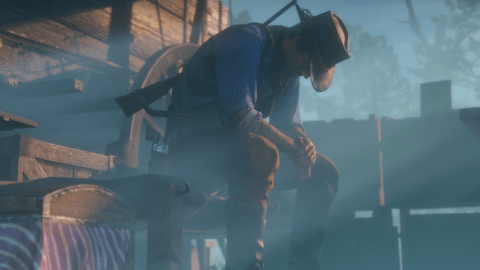Breathtaking. Literally.

(IMAGE: ROCKSTAR GAMES)
As a 56-year-old Professor of Astrophysics who plays a lot of video games, I spend a fair amount of time explaining to other 50-somethings why that’s not a bad thing.
For most people my age, video games are something their kids did—and often, they did too much of it. Of course, I like shooting aliens, zombies, etc. as much as the next inner-16-year-old, but if that was all there was to it, I would not invest the hours (and there are many) working my way through a good game.
Recently I finished Red Dead Redemption 2 (RDR2), one of the most acclaimed titles of the year. It was so good that I could see, explicitly, what makes these games so powerful: A new way of doing what human beings have always done—tell stories. That is what makes this new and ever-expanding technology worth paying attention to.
(SPOILER ALERT: If you plan on playing RDR2, you may want to stop reading.)
Red Dead Redemption is a big sprawling story, like a great 600-page novel. Taking place in 1899, its principal theme is the closing of the American West’s “Wild” era. You play as Arthur Morgan, a member of the Van der Linde gang of outlaws. But unlike most of the fictional outlaw bands you’ve seen in movies, Arthur’s compatriots make up a kind of multi-ethnic extended family that includes a large number of women, a pastor who’s fallen to opium, an aging drunk called “Uncle,” and more. Their leader, Dutch Van der Linde, considers himself a kind of prophet of the underclass as the true heirs to the American spirit of freedom and self-reliance. In his eyes, to be an outlaw means to resist mining and railroad companies and their attempts to exploit the least powerful.
Taken together, it’s the stuff of sweeping narrative as you follow Arthur and the rest of the Van der Linde gang as they fight desperately against the forces leveling the West in the name of profit. But if that’s all there was to RDR2, then it would just be a great novel or an exceptional movie. The technologies inherent in modern video gaming allows for an entirely different kind of engagement with the story whose delights are in the details.
Inhabiting the character
Much has been written about “interactivity” in games. For story-driven “role-playing games” (RPGs) like RDR2, what is fundamentally new is the player’s identification with the character. You spend hours living the story through Arthur Morgan’s eyes, and the choices you make as Arthur change the story. RDR2 is particularly adept at making these choices matter in terms of how people in the game respond to you. You become fused with your character in a way not possible with a book or movie. (But please don’t take this as an admonition to not read books!)
I’ve written before on this theme because I’m particularly interested in how creative game writers/directors can extend what’s possible with this new medium. And that brings me to a particular aspect of RDR2 that I’d like to highlight.
Many hours into the game, after you’ve bonded with Arthur’s character, you realize he’s very sick. The game brings it on you slowly—a cough that keeps getting worse. When you finally get to a doctor, you learn it’s tuberculosis—essentially, a death sentence. From that point on, the whole tenor of the story changes as Arthur weakens with each passing hour. This makes for a powerful story arc as Arthur, an outlaw, must decide what to do with what’s left of his time.
But then comes a moment which would only be possible in a game. Usually when you finish some mission (a bank or train robbery), the game leaves your character staring out at a vista, ready to move on to the next chapter. But as Arthur gets sicker, the controls stop working. There are long moments when he is just doubled over, laboring to breathe. You must wait through those moments until the game gives you the controls back. It’s subtle but speaks volumes, forcing you to consider his sickness in a powerful and visceral way.
It’s one small detail in a game rich with detail. What matters is it tells us something about what’s essentially new in the medium of video games. Human beings have been telling stories about life, love, and death for thousands of years. With each advance in our technology (the printing press, radio, film, TV, the internet), we’ve had the opportunity to invent new ways to carry out this ancient art.
That simple moment, waiting for poor Arthur Morgan to catch his breath and regain some measure of his fading strength, was a window for me into just how far video games can push us into new story-telling territory.
The post Breathtaking. Literally. appeared first on ORBITER.





